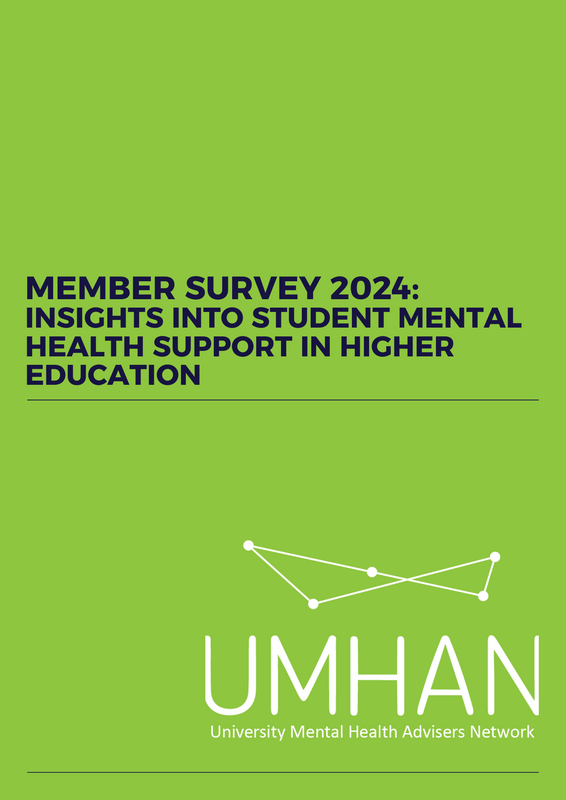
Member Survey 2024
We present the findings of the UMHAN (University Mental Health Advisers Network) Member Survey 2024, conducted online between August and November 2024. The survey gathered feedback from 92 UMHAN members (a 13% response rate) on their experiences during the 2023/24 academic year. Respondents included Mental Health Advisers (50%), Specialist Mental Health Mentors (40%), Managers (5%), and Associate Members (4%). All the members who completed this year’s survey work in Higher Education.
Key findings include:
● Student Mental Health: Concerns were raised regarding waiting times for NHS services, particularly for students awaiting autism/ADHD (Attention-Deficit Hyperactivity Disorder) assessments and those needing ADHD medication. Members also highlighted difficulties in referring students to NHS services.
● Workload and Staffing: A significant proportion of staff (35%) feel their teams are understaffed, compared to 30% who feel well-staffed. This represents a shift from 2023, when more members felt their teams were well-staffed. Caseloads for Mental Health Advisers varied, with most working with up to 50 students, and many reporting an increase in complex presentations. Specialist Mental Health Mentors reported steady or increasing caseloads, with the majority supporting students with mental health conditions.
● Working Conditions: Flexible working was highly valued, with 61% of members preferring this arrangement. However, some members reported a lack of flexibility and poor working conditions.
● Future Plans: While 34% of members plan to stay in their roles, 23% are considering leaving within the next two years, citing pay, lack of progression, and work-related stress as key reasons.
● Data Collection, Monitoring and Evaluation: Most members engage in routine monitoring of their activities with students using a mix of quantitative and qualitative tools. However, challenges such as lack of time, difficulties in gathering student feedback, and multiple data collection systems were commonly reported. Evaluation of the effectiveness of support was generally conducted at team or service level, with similar challenges.
For more details, please go the report:

Member Survey 2023
This report presents the findings of the UMHAN (University Mental Health Advisers Network) Member Survey 2023. The online survey was open to all UMHAN members for completion during September and October 2023. Members were asked to consider their responses in relation to the previous academic year (2022-23). A total of 104 members completed the survey, a response rate of 16.9 per cent which is consistent with prior member survey response rates from 2022 and 2021. The respondents included Specialist Mental Health Mentors (47.1 per cent), Mental Health Advisers (36.5 per cent), Managers (9.6 per cent) and Associate Members (6.7 per cent). Sections relating to caseload and evaluation were differentiated in the survey by Mentors, Advisers and Managers. In addition to our annual questions about caseload and working conditions, we included questions about key areas: NHS waiting times, the Higher Education Mental Health Implementation Taskforce and the University Mental Health Charter.
The UMHAN Member Survey 2023 has revealed that the caseloads of many SMHMs, MHAs and Managers have stayed about the same this year or have actually increased. Mentors have observed an increase in the numbers of students awaiting diagnostic assessments for ADHD and/or ASC whilst Advisers have remarked on the complexity and higher levels of need amongst the students they support.
Members feel that the work they do to support students with their mental health is frequently unacknowledged and unappreciated by university leaders and desperately under-resourced. In terms of their working conditions, whilst low pay coupled with increasing caseloads and responsibilities means some members are considering leaving their current role in the near future, a more flexible working environment, post-pandemic, was the norm for most respondents and was generally viewed positively.
The majority of respondents are collecting, monitoring and evaluating data in relation to their support for student mental health with many members regularly using service user surveys as their main data collection tool. Lack of time and multiple data collection systems hampering efforts to successfully measure the impact of interventions and activities were the key evaluation challenges amongst members.
Based on our survey findings, we have made the following recommendations:
- Practitioner expertise: Senior HE leaders and managers need to liaise with their mental health support staff directly when undertaking strategic level work on student mental health.
- Support for practitioner CPD: It is imperative that MHAs and SMHMs are encouraged and supported to undertake relevant CPD and that time for their CPD is protected.
- Evaluation and research: Institutional researchers and evaluators should engage with their student mental health teams to incorporate their knowledge and support them to participate in evaluation activity where appropriate.
- The Equality Act (2010): HEPs should focus on their legal duties. Reasonable adjustments are an important yet overlooked support mechanism whilst Disabled Students’ Allowances are an underused component of support for students with mental health conditions and students should be encouraged to apply.
- NHS resourcing: Senior HE leaders need to put pressure on the Government to ensure NHS funding remains at the forefront of conversations around student mental health.

Member Survey 2022
In 2022, in addition to our standard questions, we included two additional sections: one on role tasks, and another on evaluation. The roles of Mental Health Adviser (MHA) and Specialist Mental Health Mentor (SMHM) are not well defined or understood, and we hope data about tasks performed will help improve awareness of the scope and importance of both roles. Collating more information about how members and services evaluate their work will, we hope, help to provide insight into a frequently discussed topic in the sector, and to establish a more consistent approach.
This survey period has covered a time of flux and recovery; members have been reporting unusual patterns of student referrals/registrations, appointment access and student mental health presentation throughout the year. As such, the survey data may also demonstrate unusual patterns that may not continue in the coming academic years
Key points from our survey findings are:
- 81% of MHAs had 50% or more proportion of their caseloads in the high risk category
- 26% of respondents said that this number had increased over the past 12 months
- Risk assessments and mental health/wellbeing assessments are the most commonly performed tasks by MHAs
- Psychoeducation/ psychological interventions were felt to be the most effective task
- 58% or respondents felt their service was under-staffed
- Just over a third of respondents plan to leave their role between now and 5 years time.
For more details, please read our 2022 report.
Image by Alex Green on Pexels.

Member Survey 2021
As a membership organisation, UMHAN is committed to being responsive to our members. As such, we routinely survey our membership to ensure that we continually improve our service, and can confidently represent our members' voices and experience to the sector and beyond.
As well as asking for feedback on UMHAN as an organisation, we also ask for information about caseloads and working conditions.
The key findings from this report show that well over half of respondents have seen an increase in caseload over the past 12 months.
We define “high risk” in terms of deteriorating mental health, severity of mental health condition, suicide, serious self-harm, neglect, abuse, becoming socially isolated, or experiencing significant disruption to their education. 71% of Specialist Mental Health Mentors and 58% of Mental Health Advisers have identified an increased number of "high risk" students on their caseload.
This comes at a time when staff themselves are facing uncertainty about working conditions, and when Mentors in particular are facing pay cuts.
UMHAN members are subject to our Supervision and CPD requirements, which we believe help to ensure safe practice, and high quality provision for students with Mental Health Conditions. Even so, some struggle to be able to fulfil these requirements - 26% stated that they did not feel supported by their employer to access resources, meetings, training and CPD.
Our recommendations include:
- Where caseloads are high, models of casework and modes of delivery should be reviewed to guarantee workload allocation ensures safe practice.
- Specialist staff should be provided with appropriate supervision and CPD opportunities to enable them to properly support increasing and more complex presentations of mental ill health and risk.
- Employers should undertake risk assessments for all in-person work in this area, as per recommendations by the Health & Safety Executive.
To read more, please download our report.
Image by Lukas on Pexels.




